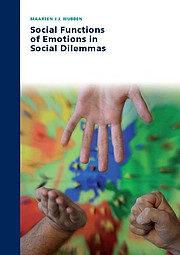Social Functions of Emotions in Social Dilemmas Defended on Friday, 5 February 2010
Social dilemmas, or situations in which individual and collective interests collide, elicit strong emotions. But are these emotions socially functional in that they help establish cooperation? Generally, they are, as four empirical chapters showed. In dyadic relations, refusal to return a favour is best reciprocated while expressing disappointment instead of anger or no emotion. This does not even lead to a negative impression. When not recipients but observers can reciprocate cooperative acts, non-cooperation out of anger or disappointment is perceived by observers as a just action to retaliate against defectors and is therefore met cooperatively. In situations where group members have to coordinate their contributions to obtain a public good, anger signals bleaker prospects than guilt does, especially when communicated by an influential fellow group member. This makes that group members are more likely to exit the group or install a democratic leader. Guilt actually promotes successful coordination by signalling that both the person that experiences guilt and the person towards guilt is experienced will contribute, which encourages people to cooperate even when coordination is difficult. Thus, emotions are indispensable, socially informative cues that typically help to establish cooperation, facilitate coordination and implement structural solutions in social dilemmas.
Keywords
Social Dilemmas, Emotion, Cooperation, Communication, Reciprocity, Public Good Dilemmas, Anger, Guilt, Disappointment, Coordination










